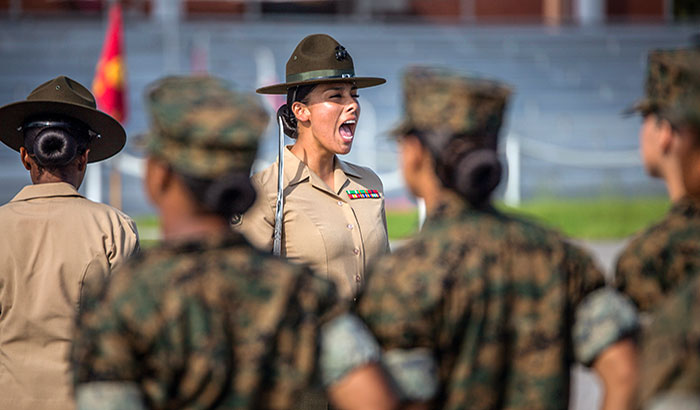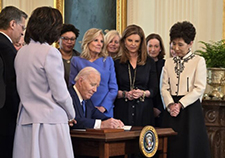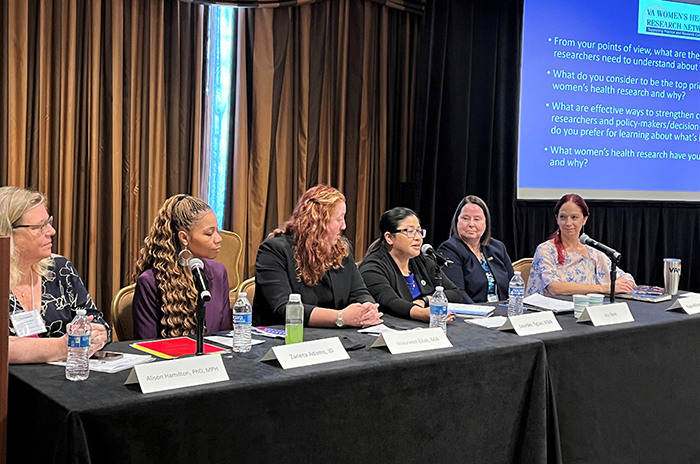Office of Research & Development |
 |
Office of Research & Development |
 |


Marine Corps Staff Sgt. Dalia Chavez, a drill instructor, gives a command at Parris Island in June 2018. (USMC photo for illustrative purposes only, by Sgt. Dana Beesley)
June 27, 2018
By Mike Richman
VA Research Communications
"My family asks why I eat so fast, and I say I learned it from the military. We were always timed."
The military is no picnic when it comes to consuming food. Eating fast and at unusual times is a way of life for many in the armed forces, particularly in boot camp and combat settings.
Researchers sought to learn how such demands affected a group of 20 female Veterans who reported changing their eating habits in response to stress in the military. They had entered the military with varied eating habits but little disordered eating.
Disordered eating refers to a wide range of abnormal eating behaviors but doesn’t meet the criteria for an eating disorder diagnosis, which is more serious.
In a VA-funded study published in November 2017 in the journal Appetite, the women described ways the military environment affected their eating. The findings suggest that the military may promote fast, irregular, binge-like eating, and that it could disrupt the reward value of food. The researchers caution that the finding may not apply to all women in the military, but only to those with certain risk factors. They hope to do larger-scale research to further explore the problem.
The women in the current study said military stressors, often related to gender, affected their eating habits. Those issues included military sexual trauma—which refers, in part, to repeated threatening sexual harassment that someone experiences during military service—and the need to meet weight requirements in general and after giving birth.
The participants also reported that poor eating habits continued after military service, often because they remained under stress.
“For some women, military service can result in socialization to poor eating habits, which when combined with exposure to stressors can lead to disordered eating,” the researchers write.

Executive Order for Women’s Health built on VA research

VA Researcher Named One of U.S.’ Top Female Scientists

2023 VA Women's Health Research Conference

Self-harm is underrecognized in Gulf War Veterans
Disordered eating is far more common than eating disorders, although the two are somewhat linked. Eating disorders relate to serious conditions such as anorexia, an obsessive desire to lose weight by refusing to eat; bulimia, when excess overeating is often followed by self-induced vomiting, purging, or fasting; and binge eating, which includes overeating without purging or other compensatory behaviors.
Dr. Jessica Breland, an investigator with the Center for Innovation to Implementation at the VA Palo Alto Health Care System in California, led the study. Dr. Shira Maguen, a researcher at the San Francisco VA Health Care System, was the principal investigator.
Their research included the same 20 female Veterans who had participated in a VA-funded study that appeared online in January 2017 in Women & Health. Breland and Maguen also collaborated on that project, which focused more on trauma exposure and its relation to disordered eating. The researchers found that military trauma that is linked to such conditions as depression and PTSD can trigger disordered eating.
In reference to her latest study, Breland says: “We allowed women in the study to speak for themselves and teach us about eating habits and behaviors. Given how little is known, we allowed the data to guide us. We are aware that this is the first step, and that more research needs to be done in this area.
“There is not a lot of research about gender differences in eating habits before, during, and after the military,” she adds. “But what little exists suggests that women Veterans may be more likely to develop disordered eating, compared with men.”
Women were eligible to participate if they reported changing their “eating habits in response to stress or trauma, or used food as a way to cope with stress or trauma.” Maguen and her team conducted focus groups and interviews with the 20 women whom they selected. The participants averaged 48 years in age, most reported household incomes below the national median of about $58,000, and more than half were women of color.
The Veterans described three military environments that could promote poor eating habits: boot camp, deployment, and being on base.
Almost all of the participants said an important characteristic of boot camp was the need to eat quickly. One woman said: “My family asks why I eat so fast, and I say I learned it from the military. We were always timed.”
Women who were overweight or close to overweight when joining the military described the need to eat fast during boot camp as incredibly difficult.
One woman said: “I remember going through the chow line, [with] the drill sergeant following behind me and [saying], 'Oh, you’re not going to eat that, are you, lard-ass … ?’ … So it was like you’re screwed no matter what you picked off the line … because if you ate junk, they were going to come get you and … if you were going to eat healthy, you’re not going to have enough time to eat it.”
The Veterans also reported eating very large portions in boot camp, sometimes due to the abundance of free, prepared food.
In relation to deployment, some women spoke of engaging in the fast, binge-like eating taught during boot camp. That style was often required, given that there was no set schedule for eating during deployment.
“Eating habits changed an awful lot [during deployment] because you ate when you could,” one woman reported. “You ate as much as you could before the flies ate your food, or you had to run off and do something and get [to] … the next stressful situation … so that was difficult.”
Women also described how being deployed affected the reward value of food. Some said military service reduced the pleasure often tied to eating because the military food did not taste good. Other issues included meal times being overly structured and food choices being limited. “You just eat it, or you starve,” one participant said.
Veterans also told of how the need to “make weight” to meet rigid military requirements affected their eating habits, connecting it to the stress of being a woman in the service.
“There is just a whole host of things that we have to deal with that [male service members] don’t have to,” one woman said, “and one of those things is being constantly judged on our appearance, which is so unfair … It’s like there is nothing we can do right as women in the military and … that translates into these eating issues when we get home.”
Some women reported how making weight could be extremely challenging following pregnancy.
“They give you nine months to gain the weight [during pregnancy], and if you’re over when you come back to work in six weeks, it’s career death, I mean really,” one participant said. “You know, they start writing you up, they start demoting you, but the men don’t have that, you know? If they’re large, it’s just because they just worked out … so with that stigma you didn’t eat in front of anybody that had any kind of pull in your career.”
Other women told how unhealthy habits could lead to disordered eating as a way to find comfort and control in stressful situations. Some used disordered eating to cope with loneliness that related to being one of a few women among many men. One participant said she and the woman she worked with felt isolated and bullied due to their gender, and that they used food as a way to experience pleasure:
“When we got in port, we would just hole up in a hotel room, and just buy a whole bunch of just comfort food, candy, cookies, and whatever it was that we wanted to pig out and eat on. So like [on the ship] it was junk food. In port, it was more junk food, and it was … just only us and the food. So we [were] in a relationship with the food, her and me, which … helped us out a lot.”
Compared with boot camp and deployment, the women described eating in base as less irregular and fast-paced. But they noted that healthy food choices on base were limited. As one woman put it, “Your options are the mess hall or Burger King and Cinnabon.” The latter is a chain of baked goods stores and kiosks usually found in shopping malls.
The Veterans also discussed a number of stressors that affected their eating habits after military service, with some saying they felt pressure upon returning home. One woman described the difficulty of relinquishing a strict military eating schedule:
“[My family said], 'We’re not in the military. You have to slow down and back away and think about what you are doing.’ So I had to change a lot when I got back to conform to their normality. So that was hard … it wasn’t clicking in my head that I was no longer in the military. They didn’t know my norm, and I didn’t know their norm, and we were just clashing all the time.”
In the end, the authors caution against generalizing these findings to all female Veterans. Given the small, non-random sample and other factors, they say more “quantitative research” is needed. Such work could also include investigating the benefits of providing resources to facilitate healthy eating and weight management, mainly in relation to military weight requirements and the transition out of military service.
Future work could also focus on “health services surrounding pregnancy-related weight change and the stress associated with being a woman in predominantly male military environments,” the researchers write.
Breland says randomly recruiting female Veterans to learn how the fast-paced military lifestyle impacts their eating habits would be worthwhile.
“We focused on this group because we wanted to understand eating in this high-risk population, as opposed to getting a general sense of how the military affects the average woman,” she says. “A more quantitative study sounds interesting. There are many great areas for future inquiry, and the hope is that more studies get funded so we can continue to explore these important questions.”
VA Research Currents archives || Sign up for VA Research updates